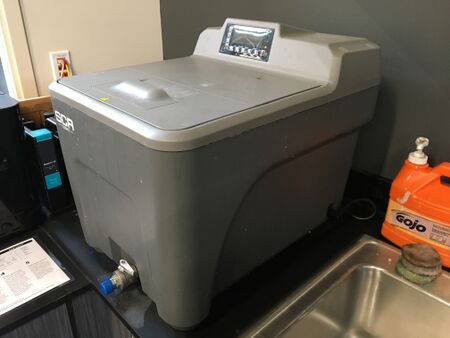Dissolvable Support Bath
Make: Support Cleaning Apparatus
Model: 1200HT
Ace: Ellie Annah (estrauss21@georgefox.edu).
Location: Prototype Lab
Description
The Dissolvable Support Bath is a Thermo Haake DL30 Circulating Bath. It is used in conjunction with both Stratasys F370 3D printers. Since these printers use QRS support material, the support can be dissolved in a heated, agitated, diluted solution of Sodium Hydroxide. Sodium Hydroxide can be dangerous when handled incorrectly, therefore there are various safety procedures associated with the use of the Dissolvable Support Bath. Below is a video of an alcohol dissolvable support bath which is not as toxic but functions the same.
Documentation
Terminology
- There is no unique terminology associated with this machine.
User Manual
Instruction Manual for the Thermo Haake DL30 Circulating Bath.
Training
Overview
Using the Dissolvable support bath is very simple. During the busy times of the semester, the bath will be left on but if it is not on then turn it on using the control panel. Next, wait for the bath to heat up completely and then place your part in it using appropriate safety attire. It may be helpful to place the part in a mesh bag, remove the basket from the bath, and tie the bag to the bottom of the basket to keep the part completely submerged. Periodically check the part until all support has been dissolved. Always wear safety equipment when opening the bath.
Demonstration
Use the correct safety procedures to place a printed part in the bath.
General Procedure
- ALWAYS USE SAFETY ATTIRE (see safety for requirements).
- Flip the black switch (inside the yellow rectangle) to turn the bath on.
- Then press the button circled in red to start the heating process.
- The red knob (circled in cyan) should always be set to about 85 degrees Celsius.
- Keep the lid shut as often as possible.
- Place the part inside of a mesh bag, tie the strings of the mesh bag to the side handles, allow the part to soak in the bath for several hours.
- Mesh bags are located in the small drawer next to the sink.
When removing parts:
- When the soaking step is completed, the basket can be lifted out and removed so that parts can be sifted through in the air instead of the solution. If you do remove basket, remove the lid first and place it in the sink. Next, lift the basket, let it drain above the bath so that it drips into the bath, then once it is barley dripping, the basket can be transferred to the sink.
- Wash the mesh bag and part thoroughly. Use paper towels to dry the part and let the part sit on paper towels and drain for a couple hours. Always inform the part's creator to wash their hands after handling the part and before eating or touching their eyes/face.
- Replace the basket and lid.
Safety
- Only Prototype Lab Mentors are allowed to use the Bath for safety concerns.
- Required safety attire is a lab coat, safety goggles, and heat/chemical protecting gloves.
- Only the Ace of the Bath and the Aces of the Prototype Lab (and Justin) are allowed to drain the tank and replenish it with a new solution of diluted Sodium Hydroxide.
- Wash your hands after using the bath and after touching parts that have been removed from the bath within the past 24 hours.
- All parts that come out of the bath should be washed and left to dry/drain excess fluid for at least an hour.
- All spills should be immediately reported to Justin and the Aces of the Prototype Lab.
- Follow the MSDS procedure in the event of getting Sodium Hydroxide on your skin, in your eyes, or if you ingest it.
- The MSDS is located next to the sink in a bright yellow binder hanging on the wall. It includes the fluids the Prototype Lab uses that could be dangerous when humans are exposed to them. The MSDS also details what to do if the fluid is ingested, gets in your eyes or on your skin, and other pertinent information.
Certification
This Quiz is a part of the F370 Quiz on Foxtale.
Troubleshooting
- What to do if the bath is beeping:
- This typically means the bath is low on water (below 1.5 horizontal holes of the basket inside).
- Take the clear bucket under the sink and use it to fill the bath until the fluid level inside is only 1.5 horizontal basket holes from the top.
- Tell the Bath Ace if you think the solution should be switched, do not do it yourself.
- The bath may be sending out an error message in which case the Instruction Manual should be consulted.
- What to do if the bath appears to be leaking:
- Immediately inform the Aces of the Lab and/or Justin.
- This would mean there is a collection of water inside of the grey catch tray underneath the bath.
- What to do in the event of a spill:
- Evacuate the lab and shut it down until the spill has been properly cleaned.
- Immediately inform the Aces of the Lab; if unavailable and the spill is large then contact Security.
- Use the spill kit.
- Follow instructions inside the kit.
- Make sure you are wearing safety attire.
Maintenance
General maintenance
Like many machines in the Maker Hub, the bath must be periodically wiped down to keep it clean and working properly. This also removes spots created by the Sodium Hydroxide. Also, there is a limit to how much support material can be dissolved and once it has been reached the tank must be emptied and refilled with new Sodium Hydroxide solution.
Specific Maintenance Tasks
| Maintenance Procedure | Frequency | Done By | Last Done | |
|---|---|---|---|---|
| 1 | Wipe down the machine | As neeeded | Lab Volunteer | N/A |
| 2 | Change the Bath Solution | When the bath starts taking a very long time to dissolve support material | Lab Volunteer | |
| 3 | Refill Sodium Hydroxide Bottles | If there is only one full bottle remaining | Lab Volunteer |
2. How to change the solution in the bath:
- Wear safety attire during the entire process.
- Retrieve a barrel to drain the fluid into.
- Unscrew the top of drain spout (make sure the drain spout is completely pushed in before unscrewing).
- Swivel the drain spout to face down.
- Align the barrel opening to be underneath the drain spout.
- Pull the drain spout out so that the fluid begins to drain.
- Completely drain all of the fluid.
- Clean the inside of the tank:
- Use water to rinse out the inside of the tank then use paper towels to wipe out the gunk.
- Be sure to also clean the basket thoroughly.
- Replace the basket.
- Fill the bath up with water (use the clear bucket under the sink, fill this with water from the sink, pour the water into the bath) until the water level reaches 1.5 horizontal basket holes from the top.
- Turn the bath on and allow it to heat up to 70 degrees Celsius.
- Take a pre-filled bottle of Sodium Hydroxide (located in the thin cabinet underneath the counter the bath sits on) and sprinkle some into the heated water.
- Allow the sprinkled amount to dissolve and repeat until all of the Sodium Hydroxide in the bottle has been dissolved in the bath.
- Refill the Sodium Hydroxide bottle if there is only one filled bottle left.3. How to fill new Sodium Hydroxide bottles:
- Wear a lab coat, nitrile gloves, and safety goggles. This is very important. The granule Sodium Hydroxide (undiluted--undissolved) is much more dangerous.
- There should be a mini funnel in the lab somewhere (it tends to move around some). Use the large Sodium Hydroxide bottle and mini funnel to refill the small bottles to the same level as the last remaining bottle. Always leave one bottle filled as a gauge for where to refill to. If a bottle has not been left filled, then fill the small bottle to about 1.5 inches below where the narrowing of the bottle begins.

